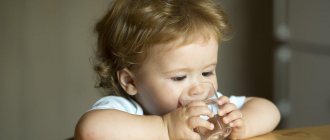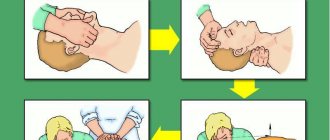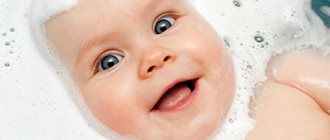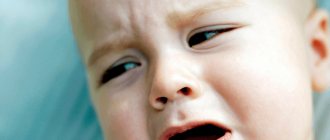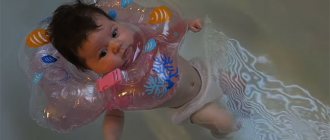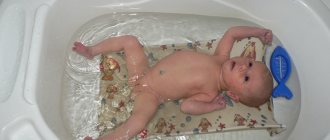Cheerful fuss in the water, splashes and foam are fun entertainment in the lives of children; most adults, remembering their childhood, see swimming in a river, pool or sea. However, the baby’s first acquaintance with water is not always rosy; the newborn cries when bathing, experiences fear or discomfort. There are many reasons for children's whims in the bath; parents should properly prepare for the procedure, avoiding common mistakes of the majority.
The child is afraid to swim
How to properly prepare for swimming
Proper preparation can minimize problems that may arise during bathing . Of course, you already know everything about the rules of hygiene for a newborn , but that’s not what we’re talking about now: observing them is unlikely to have any effect on the baby’s mood during bathing .
And we will pay attention to the following things:
- Bath time. Traditionally, children are bathed before going to bed at night . With one exception: if bathing is exciting for your children. You can only find out if this is true through experience, and it won’t take much time. An excited state refers to increased motor and emotional activity, not necessarily accompanied by crying, but in some cases, overexcitation immediately before bed can cause serious problems. In this case, you can postpone bathing time when the baby is active or resort to the help of soothing herbal decoctions that are added to the water during bathing .
It can be:
- Valerian;
- Lavender;
- Mint;
- Oregano.
You can also purchase foam for bathing infants with soothing properties.
IMPORTANT! Make sure your child does not have an allergic reaction when using herbs. It is advisable to first consult a doctor and check your child for an allergic reaction.
IMPORTANT! In the article “How to use, when to use herbs for bathing a newborn: chamomile, calendula, string, hops, oak bark, sage, herbal collection,” we described in detail exactly how to check the reaction.
- Diet. The child should not be hungry, but he should not bathe him immediately after eating . After feeding, at least one and a half hours should pass.
- Air temperature in the room where you bathe the child and in the room into which you are going to transfer him after bathing. Recommended - from 24 to 26 degrees. Before bathing, it’s good to take air baths : just undress your baby and let him lie naked for a while while you prepare the bath.
IMPORTANT! Don't forget that overheating is just as undesirable as hypothermia - both can cause discomfort.
- Water temperature. It is recommended to bathe babies at a water temperature of 37 degrees. If you are hardening your baby, then the decrease in water temperature from comfortable should be gradual. Your treasure can cry from both cold and hot water. A special bath thermometer will help you regulate the temperature, or the old proven method is your mother’s elbow. It is believed that if your elbow is comfortable in the water, then your baby will be happy too. And, as a rule, this is true.
- Bathing surface. Mom's hands are wonderful. They are comfortable and familiar, but, unfortunately, my mother doesn’t have ten of them. All kinds of slides, mattresses and hammocks for swimming come to the mother’s aid. Make sure that the surface of the restraint you choose suits your baby . Tears can be caused by a hard or slippery slide.
- The baby's health status. If you think that the baby is unwell, it is better to refuse bathing until the circumstances are clarified.
Accustoming a newborn to bathing , turning it into a pleasure, is not so difficult if you take into account all these points in advance.
How to calm your baby?
If the child is healthy, then there is no reason to worry if he cries during or after bathing. This will not last long, and the child will probably soon get used to the procedure, which he will even like in the future.
But it is still necessary to eliminate the cause that causes crying. Most often this is due to hunger. After receiving food, the baby usually calms down.
Therefore, such children should be fed half an hour before bathing. Another good method is not to immediately dress the baby in clothes, but to carry him for a while in a soft fluffy towel. This condition has a calming effect on the baby. If your baby cries all the time during an evening bath, it makes sense to move this procedure to the morning.
How to bathe properly
You are perfectly prepared for bathing , everything is fine, but the baby is still crying. What can cause a newborn baby to scream and cry while bathing ?
Note:
- Correct position while swimming. This especially applies to head position. The ears should either be completely submerged in water or remain above the water at all times. And, of course, water should not get into your mouth or nose.
- For pouring water, it is better to prepare a ladle or jug so that you are sure of the water temperature. If you have a low-quality faucet, it may give an unpleasant surprise in the form of a sudden change in temperature.
- When using detergents, do not get them into your eyes, nose or mouth. Be especially careful when washing your hair.
- A washcloth or even a bathing mitten is for older children. A mother's palm is enough for a newborn.
- Don't be nervous or panic. Your nervousness is transmitted to the baby, and he starts screaming for no reason. If you are sure that the baby is not sick, you did not boil him in boiling water, he did not choke while bathing, then nothing bad happens. Calmly assess the situation and try to find the reason for the crying. Most likely, it will not be so terrible and quite fixable.
- What if you were stuck in something wet without warning? Yes, it's stressful. Often the baby simply does not like the sudden change of environment . Many people get used to it quickly, but not all. adaptive, can come to our aid
The most likely causes of crying
It is known that infants have completely no fear of water, because for nine months of intrauterine development they were in amniotic fluid. This means that water is the ideal environment for newborns in which they feel as comfortable as possible. What is the reason for the baby’s dissatisfaction during water procedures? There are several factors that can cause a child to scream and cry while bathing:
- Fear due to the fact that there were cases of falling into water.
- Water temperature is too high or low.
- Feeling of discomfort from getting bathing products in the eyes.
- Sudden immersion in water.
- The child is sleepy or hungry - the time for taking water procedures is chosen incorrectly.
- Severe itching due to skin manifestations of allergies, pain during teething.
- Problems of a neurological or digestive nature that require additional consultation with specialists - a gastroenterologist and a neurologist.
Bathing in a diaper
Our great-grandmothers knew a lot about bathing a newborn : they bathed them in a diaper. It is now believed that this was done to prevent the child from getting splinters on the wooden walls of the trough. Nothing like this! Bathing in a diaper is a special culture, but few people remember how it’s done.
Let's describe this method and you will see for yourself:
- Before bathing, the baby must be swaddled conscientiously;
- Prepare everything you need in advance: warm water, boiling water, which you will add as the water cools, a ladle or jug from which you will water the baby.
- The bath used to be placed at an angle, and a folded diaper was placed under the baby's head. Now there is no need for such difficulties if you have an anatomical bath, a swimming slide or something else from the arsenal of your mother’s helpers.
- The baby is placed in a bathtub filled with water so that it only slightly wets the baby’s back, and they begin to gently pour warm water over the diaper, starting from the legs. Usually kids react very calmly to this. Most often they simply fall asleep in a warm, wet diaper.
- When you see that the child has gotten used to it a little, you can begin hygiene procedures. We wash in parts, carefully releasing each of the diapers and quickly putting them back as soon as we are finished with them.
- There is no need to use soap in early infancy. Limit yourself to herbs or just clean water.
- When the bath is over, carefully unwrap the diaper and quickly move the baby into a warm towel.
- And immediately to the mother, who will convince the baby that everything is fine and she is nearby.
As you can see, everything is done to ensure that your doll does not even wake up during the bathing . It’s troublesome and also limits the child’s motor activity, but there are cases when the cause of frequent crying is precisely an excess of this very activity. Then swimming in a diaper is a necessary necessity for you. Stress in this case is reduced to zero. And you also save water.
How to achieve comfortable bathing for a newborn?
- Don't force your child to bathe - if your baby is not in the mood, you don't need to keep him in the bath for half an hour because someone said "it's good for you." There is no benefit from screaming, the child will swallow air and will swell. And it will be much more difficult to calm him down.
- Do not bathe your baby if you are nervous - the baby, like a sponge, absorbs the mother’s emotions. If you are afraid to bathe, your baby will be afraid too. In this case, there are two options: relax and calm down, or give it to dad.
- Try bathing together with your mother - perhaps the baby is simply afraid to be in an unfamiliar space. Then you can keep him company. Holding the baby close to you, slowly lower yourself into the water. There’s nothing scary in your mother’s hugs, which means there’s no need to cry.
- If all else fails, take a break. The daily annoying crying of a child, the stress of parents - this is of no use to you. Whatever worries the baby now, later he will forget why he cried. In the meantime, you can rinse the baby under the tap or water it with a ladle solely for the sake of cleanliness. Gradually the baby will get used to the water, and then it will be much more difficult to get him out of there.
EXAMPLES OF GAMES AND EXERCISES TO DEVELOP INTELLIGENCE IN CHILDREN
MARIA MONTESSORI'S EARLY CHILD DEVELOPMENT METHOD
Newborn cries and screams after bathing: why?
Let's say something went wrong during bathing Or even like this: we had a wonderful swim, and then there were tears, screaming, hysterics...
Why does a newborn cry a lot even after bathing, scream , and cannot sleep?
The reasons may be different:
• Overexcited. Bathing can be stimulating. Your baby's brain signals: it's time to sleep. But it doesn’t work. What will help: bathing in the daytime, soothing decoctions, swimming in a diaper.
• Tired, wants to sleep. The baby is ready to fall asleep immediately after finishing bathing, and then there are procedures, dressing... What will help: reduce procedures after bathing to a minimum, transfer everything that is possible to the morning. Eat and sleep quickly.
• Sudden change in temperature. The air temperature was not warm enough, and the baby froze. What will help: a thermometer to help you monitor the temperature in the room and a warm towel.
• Wants back. You had fish in your family and it finally showed up. What will help: increase bathing time, try to divert attention to something else, feed immediately.
• I don't like post-swimming treatments. Happens. Just in case, make sure that everything is done correctly and nothing causes pain to the child. What will help : try to distract, talk kindly, remain calm, do everything quickly and confidently.
• Doesn't like to get dressed. It happens too. What will help: talk kindly, remain calm, do everything quickly and confidently.
• Wants to eat. Water treatments whet your appetite, there’s nothing you can do about it. What will help: minimize the procedures between bathing and feeding or feed immediately, directly in the towel.
UNFAMILIAR PLACE
The main reason why a child may cry during swimming lessons is fear of a new unfamiliar place. If your child has never been to a pool, he may simply be afraid of a new, unfamiliar environment. What to do? Visit the pool with your child a few days before the start of classes and talk about how the pool works and what other children are doing there. Attend a free trial swim so your child can get into the water with you for the first time without the fear of being separated from their parents. Constantly tell your child about activities in the pool. In simple and understandable terms, describe to your child everything that will happen during a visit to the pool, starting from the entrance to the back. Even if your child doesn't speak yet, that doesn't mean he doesn't understand what you tell him. Therefore, it is necessary to tell everything even to little ones, using very simple wording and colorful images. Parents are the choreographers of their children's emotional state. To achieve the best results in swimming lessons, constantly offer support for the child's confidence in the safety of the environment and in his own abilities, both immediately before and after the lesson in the pool. It is necessary to describe what is happening in the pool and the expected reactions of the child in friendly, positive language. Tell your child how much fun the pool will be. Remind him of the funny things that happened in the bathroom when you were swimming before pool time. Your goal should be to boost your child's self-confidence and leave them feeling positive about their upcoming activities. Reinforce a positive attitude with hugs, kisses and encouragement. Don't forget about nonverbal communication: your postures, gestures and facial expressions should convey positive feelings and confidence in what you say.
For young children, you can use the “psychological anchors” technique - tying a certain emotional state to an “anchor” - a specific stimulus. It is best to use children's songs: when talking about the pool, hum a certain melody. When you watch a video about the pool, hum the melody. When you get used to the water in the bath, hum a melody. When a child hears a familiar melody in the pool, he will immediately tune in to the right psychological mood and be ready to meet the water. Having come to the pool and hearing a familiar melody, the child will no longer be too surprised by something new or unfamiliar. The melody will create a strong supportive connection with the parent and cause the desired psychophysiological state, as with early acquaintance with water in familiar home conditions.
Let's summarize, what to do if a newborn cries during and after bathing?
For some, a child’s crying in the absence of serious problems is simply a disaster, for others it is a natural stage of development.
What should a worried mother of a capricious baby do?
- Don't be nervous yourself!
- Be attentive to the child’s condition: is he sick, hungry, doesn’t want to sleep;
- Make sure you do everything correctly;
- Find out the reason for crying;
- Monitor water and air temperatures;
- Take care of your baby's comfort in the bath;
- Try diaper bathing;
- Make sure that water and detergents do not get into places where they should not go;
- Do not delay hygiene procedures and the dressing process if the child wants to eat or sleep;
- Talk kindly to your baby.
Enjoy Your Bath!
Photos and videos: free Internet sources
Why does a child cry while bathing?
The main reasons for a baby's anxiety when immersed in water
Fright cannot be ruled out if a child begins to cry while bathing at 4 months or earlier, although he previously loved water procedures.
Perhaps last time he didn’t like something or had unpleasant feelings. For example, water has flowed into the spout or ear. Anything can frighten a baby - the sound of pouring water, splashes, loud remarks from parents. Children's skin is thinner and more sensitive than adults'. If the water is too hot or cold, the baby will experience discomfort and cry. Pediatricians recommend washing babies at a temperature of 37 degrees. Some children are more willing to swim in cooler water - about 35 degrees. If the mother postponed the water procedures to a later time, perhaps the baby just wants to sleep. Changing the regime is undesirable - it creates a large load on the baby’s nervous system, so he can become capricious and whiny. Hunger is another reason why a baby cries after or during bathing.
Important! Doctors do not recommend feeding a baby immediately before water procedures, so as not to provoke colic and vomiting. Therefore, it is advisable that he eats about an hour and a half before swimming.
A baby may cry while washing also because he is uncomfortable. The mother should take it differently, allowing the baby to move his arms and legs freely. This recommendation is relevant for children aged one and a half months. Newborns prefer to bathe in a confined space, since they have not yet forgotten the sensations they experienced in the mother's womb. If a child cries when bathing at 11 months, although before that he liked to splash in the water, this may be due to poor health. Children under one year of age are teething, which is often accompanied by unpleasant sensations. Pain in the gums, as a rule, intensifies in the evening hours, so the baby is capricious.
Why does a child cry after bathing before bed?
Water procedures calm young children and bring a lot of positive emotions to older children. But this does not always happen - some babies scream after washing in the bath, and then cannot fall asleep for a long time. Let's consider the possible reasons why after bathing a child cries a lot to the point of hysteria:
1. The baby is very tired and wants to sleep. Young children often experience tantrums due to overwork or overexcitement. 2. Sudden temperature change. If the room is fresh, then after a warm bath the child will feel cold. 3. The baby wants to continue bathing, but cannot say so. He expresses his protest by screaming and crying. 4. The baby is hungry. If more than three hours have passed since the previous feeding, the baby wants to eat, so he is capricious. 5. After bathing, a child at 3–5 months cries a lot because the towel is prickly. 6. Mom’s hands are cold. After washing, the baby's body is warm. The touch of cold fingers causes discomfort and even frightens the baby.
Particular attention should be paid to the situation when, after bathing, the child cries a lot and tightens his legs. This indicates abdominal pain. Colic most often occurs in infants up to four months of age. As soon as the gases come out, the baby will calm down. To help him, you can put a warm diaper on his stomach, give him a massage and give him dill water to drink.
Why does a child cry while swimming in the pool?
Often parents send their children to play in the pool. Imagine their surprise when the child begins to cry while bathing. This happens for several reasons:
- the baby is cold;
- he doesn’t like it when water gets on his face and ears;
- the child is afraid of the instructor and does not feel safe;
- the baby is tired;
- the child is afraid of change - new people came to the pool, the instructor changed.
If we are talking about infant swimming, then parents should know that 9 out of 10 children cry during the first 4-6 lessons. The main reason is the cold. Experienced instructors recommend buying a children's suit made of neoprene, which retains heat well.
When a child aged 3–5 years cries in the pool, it is worth asking him what causes negative emotions. It is important for parents to be there so that the baby feels their support in a new environment. How to avoid crying when swimming and after water treatments
To prevent your child from crying while bathing, you should follow these recommendations:
1. Postpone water treatments an hour earlier. It is important to adhere to a clear schedule and bathe your baby at the same time. 2. Feed the baby an hour before washing so that he does not experience severe hunger. 3. Control the water temperature. To check, you can dip your elbow into it. There should be no unpleasant sensations. 4. Stay calm while swimming, avoid loud remarks, and do not make sudden movements. 5. Make sure that water does not get into the baby’s ears, eyes and nose. 6. Talk affectionately to your baby during water procedures so that pleasant associations are formed. 7. After the bath, wrap the child up and wait until he warms up. 8. All manipulations with the baby should be carried out with warm hands. 9. Use a soft towel, because the baby’s skin is so delicate. 10. If your baby is afraid of water, you will have to fight this fear. Doctors recommend getting bath toys—rubber ducks, balls, rattles—to distract the child. 11. Use a special slide to wash the baby, after covering it with a diaper. 12. You cannot bathe your baby during illness, when he is bothered by colic or is teething.
Pediatricians recommend bathing infants with herbal extracts of chamomile, motherwort, and lavender added to the water. These plants not only have a beneficial effect on delicate baby skin, but also have a calming effect. After bathing in warm water with the aroma of herbs, the baby relaxes and falls asleep faster. However, first you should make sure that the child is not allergic to these plants.
If the baby has had a negative experience associated with bathing, it will take a lot of time for the baby to get rid of fear. Parents will have to be patient, but the efforts will certainly be rewarded. If crying during bathing bothers you for several days, it is better to tell your pediatrician about it. Perhaps the reason is poor health. The doctor will examine the child, refer him for examination and prescribe treatment.
